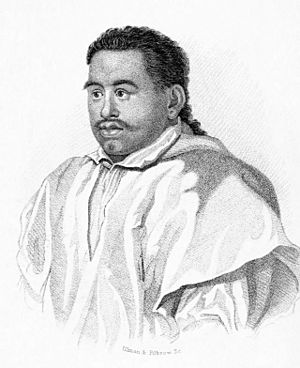Pōmare II facts for kids
Quick facts for kids Pōmare II |
|||||
|---|---|---|---|---|---|
 |
|||||
| King of Tahiti | |||||
| Reign | 1782 – 7 December 1821 | ||||
| Coronation | 13 February 1791 | ||||
| Predecessor | Pōmare I | ||||
| Successor | Pōmare III | ||||
| Regent | Pōmare I | ||||
| Born | c. 1782 | ||||
| Died | December 7, 1821 Motu Uta, Papeete, Tahiti |
||||
| Burial | Pōmare Royal Cemetery, Papaʻoa, ʻArue | ||||
| Spouse | Tetuanui Tarovahine Teriʻitoʻoterai Teremoemoe Teriʻitariʻa Ariʻipaea Vahine |
||||
| Issue | Pōmare IV Teinaiti Pōmare III |
||||
|
|||||
| House | House of Pōmare | ||||
| Father | Pōmare I | ||||
| Mother | Tetua-nui-reia-i-te-ra'i-atea | ||||
| Religion | Tahitian later Reformed |
||||
Pōmare II (born around 1782, died December 7, 1821) was the second king of Tahiti. His full name was Tū Tū-nui-ʻēʻa-i-te-atua Pōmare II. He became king in 1782, but his father, Pōmare I, ruled for him until 1803 because Pōmare II was too young. He was officially crowned on February 13, 1791.
Contents
Pōmare II's Reign
Pōmare II was first recognized as a very important leader by the ruler of Huahine. However, he was later forced to leave Tahiti. He found safety in Moʻorea in December 1808.
Returning to Power
Pōmare II did not give up. He returned to Tahiti and fought his enemies in the Battle of Te Feipī on November 11, 1815. He won this important battle. After his victory, everyone recognized him as the true king of Tahiti, Moʻorea, and the islands connected to them.
On November 15, 1815, Pōmare II declared himself King of Tahiti and Moʻorea. He made this declaration in the name of the Christian God.
Becoming a Christian King
Pōmare II started to believe that he had lost favor with the traditional god, 'Oro. With help from the missionary Henry Nott, he began to learn more about the God of the Christians.
His Baptism
Pōmare II was baptized on May 16, 1819, at the Royal Chapel in Papeʻete. Becoming a Christian helped him gain more support from the English missionaries. This support also helped him make his royal power stronger and more central.
Three missionaries from the London Missionary Society were present at his baptism. These were Henry Bicknell, William Henry, and Charles Wilson. Henry Bicknell poured water on King Pōmare's head during the ceremony.
Expanding His Kingdom
Pōmare II also worked to expand his kingdom beyond the Society Islands. He took over his father's control of the Tuamotus islands. Between 1817 and 1821, he helped solve many arguments between the different local chiefs there. However, his family's rule mainly covered the eastern and central parts of the Tuamotus.
In 1819, King Pōmare II also claimed Raivavae and Tubuai in the Austral Islands. Even though he claimed them, the local chiefs still managed these islands.
Today, a large part of the population in French Polynesia, about 54%, belongs to different Protestant churches. The Maohi Protestant Church is the biggest one. It started because of King Pōmare II, who changed from traditional beliefs to the Reformed tradition that missionaries from the London Missionary Society brought to the islands.
Pōmare II's Family
Pōmare II was first married to his cousin, Tetua-nui Taro-vahine. She was the Ariʻi (chief) of Vaiari. She passed away in 1806.
Around 1809, he married two sisters: Teriʻitoʻoterai Teremoemoe and Teriʻitariʻa. They were the daughters of Tamatoa III, a powerful chief from Raiatea.
With his second wife, Teriʻitoʻoterai Teremoemoe, Pōmare II had three children:
- ʻAimata (born 1813, died 1877), who later became Queen Pōmare IV.
- Teinaiti (born 1817, died 1818), who passed away when very young.
- Teriʻitariʻa (born 1820, died 1827), who became King Pōmare III.
The End of His Reign
Pōmare II passed away on December 7, 1821, in Motu Uta, Papeete, Tahiti. His son, Pōmare III, became the next king and ruled from 1821 to 1827.
See also
 In Spanish: Pōmare II de Tahití para niños
In Spanish: Pōmare II de Tahití para niños
 | Laphonza Butler |
 | Daisy Bates |
 | Elizabeth Piper Ensley |

